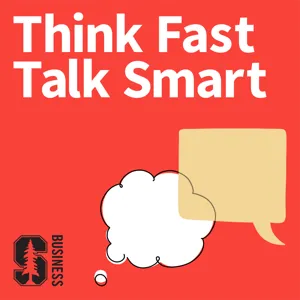Podcast Summary
Building rapport is key to effective communication and cooperation: Building rapport through understanding and respecting others' perspectives is more successful than resorting to force or intimidation in various situations, including interrogations, work, and home life.
Effective communication and cooperation in various situations, including interrogations, can be achieved through building rapport rather than resorting to force or intimidation. Lawrence and Emily Allison, married forensic psychologists and authors of "Rapport: The Four Ways to Read People," share their extensive experience in training law enforcement, military, and security agencies on this topic. They discovered that methods which build rapport are much more successful than brow-beating techniques. This approach is important not just in interrogation rooms but also at work and at home to handle conflicts, avoid arguments, and create connections. The Allisons' model of interpersonal communication consists of four elements, which they demonstrate with a role play. They also discuss the importance of understanding your own interpersonal style and that of the person you're engaging with, represented by different personality styles in the animal wheel (mouse, lion, T-rex, and monkey). Their work with the High Value Detainee Interrogation Group, which focuses on generating elite interrogators who operate according to the rule of law, has been successful in securing research funding since 2012.
Building rapport through respectful communication: Effective communication involves building rapport by respecting connections through communication, not relying on force or fear. Rapport-building methods lead to valuable information, intelligence, and evidence, while avoiding force and fear creates trust and credibility.
Effective communication during interrogations and in relationships involves establishing rapport, which is defined as a respectful connection through communication, rather than relying on force or fear. Rapport-building methods, such as rapport-based interrogations, have been found to be more effective in securing valuable information, intelligence, and evidence. The use of force can generate fear, leading to unreliable information and potential fabrications. It's essential to understand that rapport is not about getting people to like you but about creating a safe and open environment for communication. By avoiding the use of force and fear, we can build trust and credibility, leading to more productive and successful interactions in various aspects of life.
The Importance of Developing Rapport: Building rapport is crucial for our well-being, extending beyond professional contexts, and impacts mental, physical health, and relationships. It requires practice and prioritization, especially in today's socially distanced world.
Developing rapport is essential for our well-being and can be learned as a skill, not just something we naturally possess. The importance of rapport extends beyond professional contexts and impacts our mental, physical health, and relationships. Research shows that isolation and poor relationships can lead to serious health issues, including heart disease and inflammation. Building and maintaining rapport takes practice, and without it, the skills can atrophy. In today's world, with increased social distancing and reliance on technology, it's more important than ever to prioritize and work on developing rapport. It's not just about being a better communicator in a professional setting; it's about improving our personal relationships and overall quality of life.
Finding balance between honesty and empathy: Honesty and empathy are essential for building rapport. Understand others' perspectives through empathy, while maintaining honesty to create strong connections.
Building rapport involves finding the right balance between honesty and empathy. Honesty is essential, but it must be paired with empathy to avoid coming across as avoidant or overly demanding. Empathy, on the other hand, is about genuinely trying to understand another person's perspective, even if it's vastly different from our own. It's a challenging skill, especially when dealing with individuals from diverse backgrounds or experiences. To build empathy, we need to move beyond just imagining how we would feel in someone else's shoes and actively work to understand their unique experiences and perspectives. By combining honesty and empathy, we can create strong, meaningful connections with others.
Understanding another's perspective through empathy: Empathy involves making an effort to understand another's perspective, even in power imbalanced situations, to gain insights and build stronger connections.
Empathy is an act of imagination and understanding, rather than just an emotional response. It involves making an effort to understand another person's perspective, even if it's different from our own. This can be particularly important in situations where there is a power imbalance, such as in counseling or interrogations. By empathizing, we can gain valuable insights and build stronger connections with others. It's important to remember that everyone is unique, and what drives one person may not be the same for another. Empathy requires active listening and a genuine desire to understand, rather than making assumptions or imposing our own values. As Dickens showed us, the power of empathy can even lead to societal change.
Respecting autonomy builds rapport and influences actions: Provide choices, acknowledge silence or refusal, and respect individuals' autonomy to build trust and effective interactions.
Understanding and respecting the concept of autonomy is crucial in building rapport and influencing people's actions, whether in personal relationships or professional settings like suspect interviews. Autonomy refers to the desire to be in control of one's own decisions and destiny. When people feel their autonomy is being threatened, they may rebel against it. Providing choice whenever possible and acknowledging the right to silence or refusal can help reduce tension and create a more authentic and effective interaction. It's essential to remember that these techniques are not tricks but rather a genuine approach to respecting individuals' autonomy and fostering trust. When encountering resistance, it's important to understand the person's background and motivations to tailor the approach effectively.
Empower interviewees for productive conversations: Effective communication involves understanding others' perspectives, giving autonomy, and building trust for valuable information.
Effective communication and interview techniques involve understanding the other person's perspective and giving them autonomy in decision-making. This approach builds trust and respect, leading to more productive conversations and potentially valuable information. It's essential not to make assumptions or use coercive tactics, as these can damage relationships and result in inaccurate or unreliable information. Instead, maintain a clear position and allow the interviewee to make informed decisions. Even with seemingly uncooperative individuals, maintaining respectful communication can lead to unexpected insights and intelligence. A practical example of this can be seen in customer service interactions, where approaching the situation with empathy and allowing the customer autonomy in problem-solving leads to better outcomes. Overall, the goal is to create an environment where the interviewee feels empowered to share information, fostering a positive and productive interaction.
Teaching children to reflect on their actions for personal growth: Encouraging reflection helps individuals gain deeper understanding and insight from their experiences, leading to effective problem-solving and personal growth.
Effective problem-solving and personal growth involve teaching children to take responsibility for their actions, reflect on their behavior, and make amends. Reflection is an essential component of this process, as it allows individuals to gain deeper understanding and insight from their experiences. Brett, the podcast host, exemplifies this skill through his interview techniques, which encourage interviewees to explore their thoughts and ideas further. Brett started his podcast, "The Art of Manliness," as a response to feeling unfulfilled by men's publications that focused on superficial topics. By creating a platform for men to discuss and learn about topics beyond stereotypes, he aimed to challenge societal perceptions and promote personal growth.
Reflecting back what you've heard for clearer communication: Active listening and reflecting back key points leads to clearer communication, deeper understanding, and stronger relationships.
Effective communication and understanding can be achieved through active listening and reflective responses. During a conversation, reflecting back what you've heard can help clarify the speaker's intentions and provide opportunities for deeper exploration of their thoughts and feelings. This technique, known as simple reflection, can be particularly useful in situations where the speaker's meaning may not be entirely clear or when you want to gain a better understanding of their perspective. By focusing on the key points and asking clarifying questions, you can help the speaker feel heard and valued, while also gaining valuable insights into their beliefs and motivations. This approach can lead to more meaningful and productive conversations, and can help build stronger relationships based on mutual understanding and respect.
Empathy and honesty in communication: Effective communication involves empathy, honesty, open-ended questions, and reflection techniques like the 'rule of three' to navigate sensitive conversations and create a safe environment for open dialogue.
Effective communication, especially during sensitive conversations, requires empathy and honesty. In the discussed scenario, Emily demonstrated this by asking open-ended questions and expressing concern for M's feelings, rather than delivering a blunt answer. The use of the "rule of three" reflection technique can also help navigate difficult conversations by allowing both parties to explore the issue from different angles before delivering a bottom line. Ultimately, the goal is to create a safe and supportive environment for open dialogue, which can lead to positive outcomes and improved relationships.
Communicating difficult messages with empathy: Effective communication involves pairing empathy with honesty and understanding social dynamics to build rapport and deliver messages effectively.
Effective communication, especially in challenging situations, involves a combination of honesty, empathy, and understanding the social dynamics at play. The speaker shares an example from their book about delivering difficult messages, emphasizing the importance of pairing empathy with the bottom line. They also mention the concept of social dynamics and use the analogy of an "animal circle" to describe how people may behave in different ways (confrontational, submissive, cooperative, etc.) and the need to adapt communication style accordingly. Overall, the key takeaway is that building rapport and delivering messages effectively requires a thoughtful, empathetic, and adaptive approach.
Understanding Interactions through the Interpersonal Wheel: The Interpersonal Wheel theory explains how power and communion dynamics shape our interactions, and adapting behavior based on these dimensions can lead to effective communication and positive relationships.
Our interactions with others reveal important aspects of our personality, and the Interpersonal Wheel theory helps us understand these dynamics. The theory suggests that interactions have two dimensions: power and communion. The power dimension deals with control and submission, while the communion dimension deals with love and conflict. Understanding where we fall on these dimensions can help us navigate interactions effectively. For instance, being submissive in a power dynamic doesn't mean surrender but can be a position of strength when done with humility and persistence. Similarly, cooperation and warmth on the communion axis can foster positive interactions. The key is to avoid extremes and adapt our behavior to the situation. So, next time you're in an interaction, consider where you and the other person stand on the power and communion dimensions, and adjust your behavior accordingly.
Adopting the 'mouse' position during interactions: Stay calm and listen effectively when dealing with confrontational individuals, maintaining control and giving clear messages.
Adopting the "mouse" position during interactions, characterized by humility, perseverance, and the ability to listen, can be a position of strength. This approach is particularly effective when dealing with confrontational individuals, known as "T-Rexes," who thrive on conflict. Instead of trying to match their aggression, it's essential to maintain control of the dynamic by staying calm and giving clear, direct messages. While it's important to understand that the interaction doesn't need to remain in the same position forever, sudden shifts from conflict to cooperation aren't advisable. To learn more about this approach and discover your preferred social interaction style, visit www.ground-truth.co.uk and check out the book "Report the Four Ways to Read People."
Apply what you learn: Utilize resources, sign up for Stitcher Premium, leave reviews, and share the podcast to maximize learning and growth
Brett McKay reminds us to utilize the resources available, such as the articles on artofmanliness.com and the free episodes of the AWIM Podcast on Stitcher Premium. He encourages listeners to leave reviews and share the show with others who may benefit. Ultimately, the goal is to make the most of the knowledge gained and apply it to our daily lives. Remember, the real value comes from implementing what we learn. So, head to the website, sign up for Stitcher Premium, leave a review, and share the podcast with others. Keep learning and keep growing.













